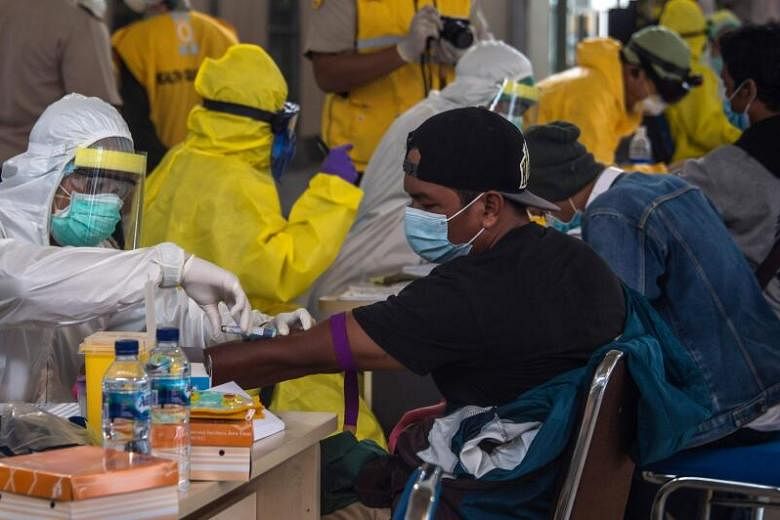JAKARTA - Indonesia is ramping up health protocols at key borders to deal with its returning migrant workforce amid the Covid-19 crisis, as thousands of Indonesian workers are on their way home.
To illustrate the magnitude of this homecoming, foreign minister Retno Marsudi said that as many as 68,614 Indonesians have arrived from Malaysia alone, by sea, land and air, between March 18 and April 29. She also said that since the onset of the Covid-19 outbreak, Indonesia has seen 11,864 cruise ship crew members returning from 17 foreign countries, while another 2,339 are expected to follow suit.
In addition to these, 1,381 other Indonesian migrant workers of various professions from many parts of the world have also returned home, Ms Retno added, and about 33,000 others are expected to have their employment contracts expire within the next three months.
Ms Retno said the government discussed this inflow of Indonesian migrant workers at a meeting on Wednesday (April 29) and decided on policies to mitigate the possible risk of importing Covid-19 cases.
"First we need to make sure all incoming Indonesians comply with the mandatory health protocols, especially at the point of arrival in Indonesia, and we try to do the same at the point of departure," Ms Retno said in a virtual press conference on Thursday morning.
She was joined by Tito Karnavian, domestic affairs minister, and Prof Wiku Adisasmito, head of the expert team at Indonesia's Covid-19 task force. The latest efforts to tackle the spread of the virus were disclosed.
The government has designated Jakarta, Bali, Makassar and Medan as entry points for Indonesians returning home by air, while Batam, Tanjung Priok, Benoa, Dumai and Tanjung Balai Karimun are the entry points for those returning home by sea.
"At each entry point, there will be dedicated quarantine facilities for those who have symptoms. We also (have) dedicated transit facilities for incoming migrant workers before they go back to their homes in various areas in Indonesia," Ms Retno added.
Returning Indonesians who do not have symptoms will, nonetheless, be strongly encouraged to self-isolate at home for 14 days. Local governments down to village level are mobilising to ensure all isolation measures are complied with, Ms Retno said.
The foreign minister explained that those who do not have separate rooms at home will be referred to centralised isolation facilities.
At the same press conference, Dr Tito said this is the first time all Indonesia provinces were affected by a single health threat. He compared the Covid-19 outbreak to dengue and malaria, diseases which have in the past affected only parts of Indonesia and not the whole country.
The retired police general, who received his PhD from Singapore's S. Rajaratnam School of International Studies, stressed that the current health crisis had a great impact on the economy, with businesses seeing their revenues plummet. This could trigger a social crisis that may in turn lead to a security crisis, if the government is perceived as not doing enough to address the consequences of the pandemic.
Therefore, it is important to instil a sense of urgency and understanding of the crisis in all of Indonesia's 34 provincial governors and more than 500 mayors and regents, so they are prepared for the worst-case scenario.
"A sense of crisis is very important to be informed to all heads of the local governments… so it would affect their way of thinking… and would make them overestimate rather than underestimate (the crisis). When they have an 'overestimate' mindset, they will prepare a worst-case scenario," Dr Tito said.
"They are scared of coronavirus, but they need something for their stomach. If you are hungry you can get very emotional or even die. Therefore, food security is important."
The national government and some of the most affected regions across Indonesia have started to roll out social programmes to help those most affected, fully aware that the deadly virus should not just be fought on the healthcare front, but the economic front as well.
Dr Tito also noted that mass prayers were still held across Indonesia, even though mass religious gatherings have been banned as part of tough social distancing measures or semi-lockdowns.
Three provinces and 22 regencies and cities across Indonesia have adopted semi-lockdown measures requiring students to operate from home, employees of non-essential sectors to work from home and everyone to pray at home.
But Indonesia is facing challenges when it comes to enforcing these bans, especially in deeply religious provinces like Aceh, the country's western-most province, where the government must roll out persuasive rather than coercive measures. Local religious leaders in Aceh are helping persuade the people of their province.
"Persuasive measures are being prioritised rather than coercive measures. But to some extent when we find certain areas with high infections and mass gatherings are still being held, we must employ coercive measures," said Dr Tito, citing an example where the government stepped in and managed to cancel a religious gathering of 8,000 Muslims that was to take place in South Sulawesi on March 19.
"We are a country that recognises official religions (which include Islam, Christianity, Confucianism) and everyone must have a religion. Everything about religion is very sensitive," Dr Tito said.
As of Wednesday, Indonesia had more than 9,700 confirmed Covid-19 cases and had suffered 784 deaths, the highest recorded number of coronavirus fatalities in South-east Asia.












